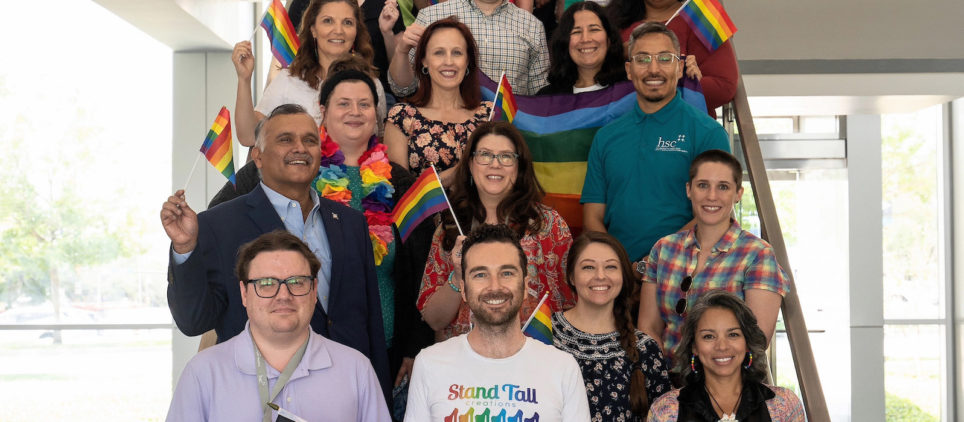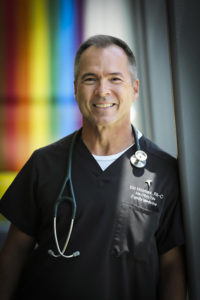Supportive environment boosts mental health of LGBTQ+ people

Justin Dam, a second-year Texas College of Osteopathic Medicine student at The University of North Texas Health Science Center at Fort Worth, said that prior to coming out, he feared that friends and family would no longer accept him.
“That really made me feel lonely at times,” he said. “It became hard to feel close to people. I was so scared of what it all meant. And then, of course, once I did come out, it was so much better to be able to live my authentic self and not have to hide, especially from my parents.”
Dam’s story, which has special significance during national Pride Month in June, is a familiar one echoed throughout the LGBTQ+ community — though some similar stories end with fractured families, broken relationships or worse.
The San Antonio native is now president of HSC’s Pride organization, which works to ensure a welcoming environment for lesbian, gay, straight, bisexual, transgender and queer people at the university by providing education, resources and support. He hopes to pursue a career at the cross-section of family medicine and psychiatry so he can help other LGBTQ+ people by providing gender-affirming care.
Nurturing organizations like Pride are critically important for the mental health of LGBTQ+ students, Dam said. Pride’s social events, peer activities and mentoring can offer its members a sense of belonging they might not have found at home or in other social groups.
A 2021 University of Michigan study found that transgender college students are 295% more likely to be diagnosed with depression, 253% more likely to suffer from anxiety, 345% more likely to contemplate suicide and 421% more likely to attempt suicide than their cisgender peers.

Assistant Professor
HSC faculty member Vic Holmes recently conducted a study that correlates, among other things, suicide rates among the LGBTQ+ community with political actions and rhetoric. The physician assistant and assistant professor in the School of Health Professions conducted a survey of 68 people spanning 22 counties across the state. His research was conducted from 2018 to 2020, when the so-called “bathroom bill” was being debated in the Texas Legislature.
Holmes’ survey found more than 54% of people who identify as LGBTQ+ said they had seriously considered suicide, nearly 28% made plans for how they would commit suicide, and a little more than 10% attempted to take their own life. Holmes’ study is being submitted for publication this summer.
“When governmental leadership demonstrates, tolerates and fosters anti-transperson sentiment through targeted legislation, the risk of suicide for this vulnerable population increases,” the study stated.
Holmes and his husband, Mark Phariss, were one of two couples who in 2013 challenged Texas’ ban on same-sex marriage, understands the anxiety-inducing fear of isolation. He said the support he received from HSC leadership and around campus reinforced the value of an organization like Pride.
“HSC has been one of the best environments for LGBTQ+ community members to express their authentic selves,” he said. “When Mark and I first pursued marriage equality in 2013, we were concerned about the potential for the political risk of involving the school. But a host of leaders at HSC stood behind us and supported our efforts wholeheartedly.”
Holmes’ research and the revitalization of HSC’s Pride organization was spurred by a former TCOM student, Dr. Roman McInnerney. In 2013, McInnerney noticed the group wasn’t active after its past leadership graduated, so he revived it.
Later, McInnerney was disappointed by the lack of concrete data on what LGBTQ+ students needed from health services and set in motion the research that would lead to Holmes’ study titled “Health and Wellness Needs Assessment of Adult Transgender Persons in Texas: Preliminary Data Analysis.” McInnerney is listed as a co-author of the study.
Dam said the presence of Pride on HSC’s campus was a huge factor in his decision to attend the university.
“For me, that was the first step of scouting out schools in general,” he said. “I knew that was really important to have a school with a strong Pride program. Something I asked in all of my interviews was, ‘How involved is your campus with regard to LGBTQ efforts?’”
Since he took over as president, Pride has hosted faculty panels about LGBTQ care, a speaker event about gender-affirming care, and a drag brunch fundraiser. He plans to host a “second-chance” prom that will allow LGBTQ students the opportunity to attend a dance as their authentic selves.
Holmes, through his personal fight for equality and his research, said he is living proof of how a supportive, inclusive system can lead to better mental and physical health.
If he could talk to his younger self, Dam said he would tell that person about the supportive communities and friends he will find — and that he will never again have to hide his true self.
“You are going to be OK, and although you may not believe it, one day you are going to be so proud and happy to be gay,” Dam said.






Social media